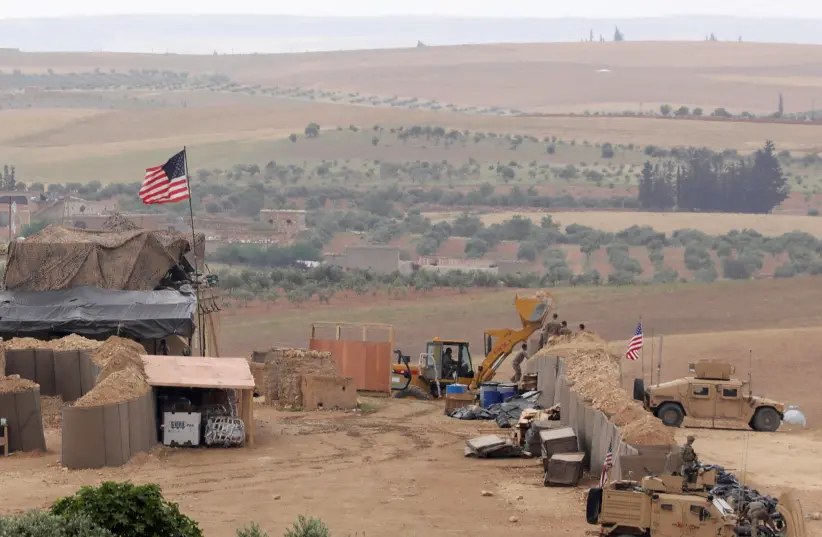Syrian defence Minister met yesterday with Iran’s President during his landmark visit to Tehran. In the Turkish-Syrian saga, Syria is conditioning the withdrawal of the Turkish military from its territory as a prerequisite for any normalization in relations between the two countries. At the same time, representatives from the AANES meet with a French delegation headed by Stéphane Romatet, the director of the Crisis Management and Support Center of the French Ministry of Foreign Affairs. Meanwhile, an Israeli newspaper examines why a drone attack on a US base in Syria is the latest Iranian threat to the US forces.
Prospects and pitfalls of a Turkish withdrawal from northern Syria
Syria has conditioned the withdrawal of the Turkish military from its territory as a prerequisite for any normalization in relations between the two countries, London-based New Arab reported.
However, as analysts note, a full Turkish withdrawal in the near future is unlikely for a number of reasons, and an eventual withdrawal will likely prove immensely complicated.
Turkish President Recep Tayyip Erdogan is eager to renormalize relations with his Syrian counterpart Bashar al-Assad for the first time since 2011.
Turkey severed ties that year when Assad violently crushed a popular revolt against his rule, sparking a violent civil war that lasted over a decade and left an estimated 500,000 people dead.
“Syria has conditioned the withdrawal of the Turkish military from its territory as a prerequisite for any normalization in relations between the two countries”Turkey took in millions of Syrian refugees fleeing that vicious conflict. However, in recent years, hostility towards this large refugee population inside Turkey has worsened as the economic situation worsened.
Erdogan, who is running for re-election this year, hopes that normalizing ties with Assad could facilitate the resettlement of as many as three million refugees in northern Syria.
But Damascus says Ankara must withdraw all its military forces from Syria first.
In a series of military operations launched in 2016-19, Turkey invaded and occupied three separate parts of northern Syria with the help of Syrian opposition fighters it trained and used as proxies.
Most of these areas were previously controlled by the Syrian Kurdish People’s Protection Units (YPG), an offshoot of the Kurdistan Workers’ Party (PKK) Turkey has fought for decades.
Ankara also has troops in Syria’s north-western Idlib province, deployed under the tripartite Astana agreement with Iran and Russia. Large swathes of that province remain outside of Assad’s control and are ruled over by the powerful Hayat Tahrir al-Sham (HTS) Islamist group.
It’s also home to millions of displaced, who could flee over the border into Turkey if there is another ferocious Russian-backed Syrian offensive.
There is also the question of what happens to the thousands of armed proxy militiamen Turkey uses in these areas after an eventual withdrawal.
“A partial Turkish drawdown of forces is possible, but a full withdrawal is less likely,” Emily Hawthorne, a senior Middle East and North Africa analyst at the risk intelligence company RANE, told The New Arab.
AANES, France Stress Expanding Support For NE Syria
Kurdish news agency North Press reported that representatives from the Autonomous Administration of North and East Syria (AANES) and the French government stressed in a meeting on Sunday that anti-terrorism support for the AANES should not be limited to the military aid but include economic and humanitarian help as well.
These remarks were made during a meeting in Qamishli city, northeastern Syria, on Sunday between the Co-chair of the AANES Department of Foreign Relations, Badran Chia Kurd, and a French delegation headed by Stéphane Romatet, the director of the Crisis Management and Support Center of the French Ministry of Foreign Affairs.
The meeting discussed the Syrian-Turkish rapprochement and the latest developments in the region, including recent Turkish military escalations and the threat of the Islamic State (ISIS), read a statement on the department’s website.
The Syrian-Turkish rapprochement comes at the expense of “a segment of the Syrian people,” Co-chair Chia Kurd said. “It undermines the efforts made for a political solution in Syria and quashes the UN’s efforts to find a political solution in line with UN Resolution 2254.”
French representative Stéphane Romatet said that his government is closely following the developments in the region.
The French diplomat voiced his country’s concerns over ISIS presence in the region, adding that the extremist group still threatens the region.
He added that the French government is committed to remaining in the region until the anti-ISIS mission is over.
A drone attack on a U.S. base in Syria is the latest Iranian threat
Jerusalem Post is looking at why a drone attack on a US base in Syria is the latest Iranian threat to the US forces.
Last week, several drones targeted the U.S. garrison at Tanf, Syria, an area that is home to US-backed Syrian fighters. It is located near the Jordan-Iraq border in Syria’s desert.
Tanf is a forlorn outpost that was created during the Syrian Civil War to help support Syrian rebels engaged in the anti-ISIS mission. There are also civilians in the area. The Syrian regime and pro-Iran fighters have targeted Tanf many times in the past, usually using drones, including in the latest attack.
There are also civilians in this area. The Syrian regime and pro-Iran fighters have targeted Tanf many times in the past, usually using drones. The latest attack involved several drones.


